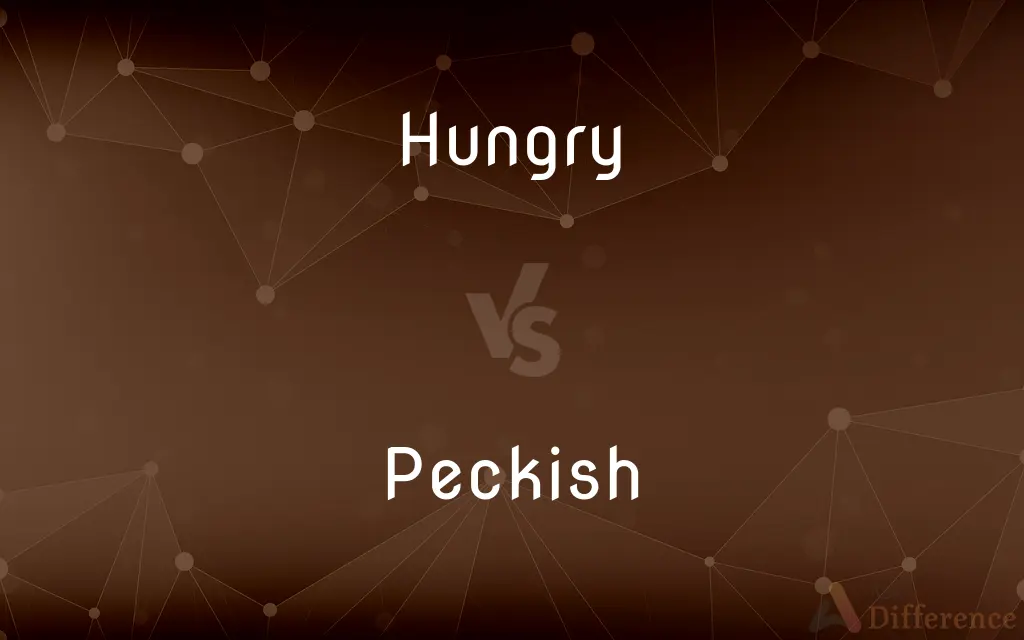Hungry vs. Peckish — What's the Difference?
Edited by Tayyaba Rehman — By Maham Liaqat — Updated on March 30, 2024
Hungry describes a strong need to eat, while peckish indicates a mild, slight hunger.

Difference Between Hungry and Peckish
Table of Contents
ADVERTISEMENT
Key Differences
Hungry signifies a more intense desire for food, often accompanied by physical symptoms like stomach rumbling. In contrast, peckish refers to a light hunger or the beginning stages of feeling hungry, without the urgency or discomfort associated with being very hungry.
While being hungry can imply a need for a substantial meal to satiate the body, being peckish might only necessitate a small snack or nibble to tide one over. Peckish is a more casual, less urgent term, often used when the hunger is not overwhelming or when a small amount of food would suffice.
In terms of timing, feeling hungry usually comes from going a longer period without eating, leading to a more pressing need for food. Peckish, however, might occur shortly after a meal or in anticipation of the next meal, indicating a desire for a little something to eat rather than a full meal.
Being hungry is a universal sensation, recognized as a basic physical need. Peckish, on the other hand, is a term more commonly used in British English, reflecting a colloquial way to express a minor hunger.
The choice between saying one is hungry or peckish also reflects the speaker's current state; "hungry" may convey a more significant, immediate need for food, while "peckish" is lighter, suggesting a whimsical or less critical desire to eat.
ADVERTISEMENT
Comparison Chart
Intensity
Strong need for food.
Mild, slight hunger.
Physical Sensation
Often comes with discomfort.
Less urgent, no significant discomfort.
Satiety Needed
Requires a substantial meal.
Can be satisfied with a small snack.
Timing
Results from longer periods without eating.
Can occur anytime, often between meals.
Cultural Usage
Universal in its understanding and use.
More colloquial, common in British English.
Implication
Signifies an immediate, pressing need.
Indicates a light, whimsical desire for food.
Compare with Definitions
Hungry
Experiencing a strong desire or need to eat.
After the long hike, I was so hungry I could eat a horse.
Peckish
Indicates a mild form of hunger.
By mid-afternoon, she usually felt peckish and had a snack.
Hungry
Often implies the need for a full meal to satisfy.
She was hungry enough to order the largest pizza they had.
Peckish
Feeling a slight, often whimsical hunger.
I'm a bit peckish; maybe I'll grab an apple.
Hungry
Associated with a more urgent need to eat.
The kids came in from playing outside, looking hungry and tired.
Peckish
A small amount of food is sufficient to satisfy.
Feeling peckish, he reached for a handful of nuts.
Hungry
Indicates a significant physical need for nourishment.
Being hungry for hours, his stomach began to grumble loudly.
Peckish
Particularly common in British English to describe mild hunger.
After the movie, I was feeling peckish, so we stopped for some ice cream.
Hungry
Recognized and understood as a basic human sensation.
No matter where you are in the world, feeling hungry is a common experience.
Peckish
Often used in a more casual, less urgent context.
Around tea time, I often feel a bit peckish.
Hungry
Feeling or showing the need for food
I was feeling ravenously hungry
Peckish
Ill-tempered; irritable.
Hungry
Experiencing a desire or need for food.
Peckish
Chiefly British Somewhat hungry.
Hungry
Extremely desirous; avid
Hungry for recognition.
Peckish
(colloquial) mildly hungry
Hungry
Characterized by or expressing hunger or craving
Hungry eyes.
Peckish
(colloquial) irritable; crotchety
Hungry
Lacking richness or fertility
Hungry soil.
Peckish
Inclined to eat; hungry.
Hungry
Affected by hunger; having the physical need for food.
My kids go to bed hungry every night because I haven’t got much money for food.
I woke up very hungry and made some toast.
Peckish
Somewhat hungry
Hungry
Causing hunger.
All this gardening is hungry work.
Peckish
Easily irritated or annoyed;
An incorrigibly fractious young man
Not the least nettlesome of his countrymen
Hungry
(figuratively) Eager, having an avid desire (‘appetite’) for something.
The students are hungry to learn
Young and hungry
Hungry
Not rich or fertile; poor; barren; starved.
A hungry soil
Hungry
Feeling hunger; having a keen appetite; feeling uneasiness or distress from want of food; hence, having an eager desire.
Hungry
Showing hunger or a craving desire; voracious.
The cruel, hungry foam.
Cassius has a lean and hungry look.
Hungry
Not rich or fertile; poor; barren; starved; as, a hungry soil.
Hungry
Feeling hunger; feeling a need or desire to eat food;
A world full of hungry people
Hungry
(usually followed by `for') extremely desirous;
Athirst for knowledge
Hungry for recognition
Thirsty for informaton
Common Curiosities
What is the difference between being hungry and peckish?
Being hungry indicates a strong need to eat, while being peckish refers to a mild hunger.
Is it appropriate to say "I'm peckish" before a meal?
Saying "I'm peckish" typically suggests looking for a snack rather than a full meal, but it can be used before meals to indicate a readiness to eat.
What kind of foods would satisfy someone who is peckish?
Light snacks, such as fruits, nuts, or crackers, usually suffice to satisfy someone who is peckish.
How does one describe the transition from peckish to hungry?
The transition involves a mild hunger becoming more intense and potentially accompanied by physical signs of discomfort, indicating a need for a substantial meal.
Can peckish lead to hungry if not addressed?
Yes, if the slight hunger indicated by being peckish is not satisfied, it can intensify into being hungry.
How do cultural perceptions of hunger and peckishness vary?
Cultural perceptions can influence how hunger is expressed and managed, with some cultures having specific words or phrases similar to "peckish" to describe mild hunger.
Does feeling peckish occur at specific times?
While it can happen at any time, feeling peckish often occurs between meals or in anticipation of the next meal.
Is "peckish" a term used globally?
"Peckish" is understood globally but is more commonly used and recognized in British English.
Is there a psychological aspect to feeling peckish?
Yes, feeling peckish can be influenced by boredom, stress, or habit, rather than actual physical hunger.
Can being peckish be a sign of healthy eating habits?
Feeling peckish between meals can be normal and might indicate a balanced diet, especially if satisfied with healthy snacks.
Can activities influence feeling peckish?
Activities, especially those that are mentally or physically engaging, can increase the likelihood of feeling peckish by burning energy.
Is being peckish a temporary state?
Yes, being peckish is a temporary state that can be quickly alleviated with a small snack.
Does the intensity of hunger affect meal choices?
Yes, the intensity of hunger can influence both the size and type of meal chosen; stronger hunger may lead to choosing larger or more calorie-dense meals.
Can someone feel peckish immediately after eating?
It's possible to feel peckish soon after eating, especially if the meal was light or lacked protein and fiber, which help promote satiety.
How should one address feeling peckish in a healthy manner?
Opting for nutritious snacks, like fruits or nuts, can healthily address feeling peckish without leading to overeating.
Share Your Discovery

Previous Comparison
Cement vs. Matrix
Next Comparison
Block vs. ChunkAuthor Spotlight
Written by
Maham LiaqatEdited by
Tayyaba RehmanTayyaba Rehman is a distinguished writer, currently serving as a primary contributor to askdifference.com. As a researcher in semantics and etymology, Tayyaba's passion for the complexity of languages and their distinctions has found a perfect home on the platform. Tayyaba delves into the intricacies of language, distinguishing between commonly confused words and phrases, thereby providing clarity for readers worldwide.















































